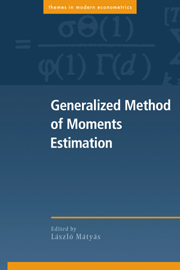Book contents
- Frontmatter
- Contents
- Contributors
- Preface
- 1 Introduction to the Generalized Method of Moments Estimation
- 2 GMM Estimation Techniques
- 3 Covariance Matrix Estimation
- 4 Hypothesis Testing in Models Estimated by GMM
- 5 Finite Sample Properties of GMM estimators and Tests
- 6 GMM Estimation of Time Series Models
- 7 Reduced Rank Regression Using GMM
- 8 Estimation of Linear Panel Data Models Using GMM
- 9 Alternative GMM Methods for Nonlinear Panel Data Models
- 10 Simulation Based Method of Moments
- 11 Logically Inconsistent Limited Dependent Variables Models
- Index
5 - Finite Sample Properties of GMM estimators and Tests
Published online by Cambridge University Press: 04 February 2010
- Frontmatter
- Contents
- Contributors
- Preface
- 1 Introduction to the Generalized Method of Moments Estimation
- 2 GMM Estimation Techniques
- 3 Covariance Matrix Estimation
- 4 Hypothesis Testing in Models Estimated by GMM
- 5 Finite Sample Properties of GMM estimators and Tests
- 6 GMM Estimation of Time Series Models
- 7 Reduced Rank Regression Using GMM
- 8 Estimation of Linear Panel Data Models Using GMM
- 9 Alternative GMM Methods for Nonlinear Panel Data Models
- 10 Simulation Based Method of Moments
- 11 Logically Inconsistent Limited Dependent Variables Models
- Index
Summary
Although GMM estimators are consistent and asymptotically normally distributed under general regularity conditions, it has long been recognized that this first–order asymptotic distribution may provide a poor approximation to the finite sample distribution. In particular, GMM estimators may be badly biased, and asymptotic tests based on these estimators may have true sizes substantially different from presumed nominal sizes.
This chapter reviews these finite sample properties, from both the theoretical perspective, and from simulation evidence of Monte Carlo studies. The theoretical literature on the finite sample behavior of instrumental variables estimators and tests is seen to provide valuable insights into the finite sample behavior of GMM estimators and tests.
The chapter then considers Monte Carlo simulation evidence of the finite sample performance of GMM techniques. Such studies have often focussed on applications of GMM to estimating particular models in economics and finance, e.g., business cycle models, inventory models, asset pricing models, and stochastic volatility models. This survey reviews and summarizes the lessons from this simulation evidence.
The final section examines how this knowledge of the finite sample behavior might be used to conduct improved inference. For example, bias corrected estimators may be obtained. Also, properly implemented bootstrap techniques can deliver modified critical values or improved test statistics with rather better finite sample behavior. Alternatively, analytical techniques might be used to obtain corrected test statistics.
- Type
- Chapter
- Information
- Generalized Method of Moments Estimation , pp. 128 - 148Publisher: Cambridge University PressPrint publication year: 1999
- 4
- Cited by



